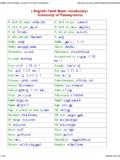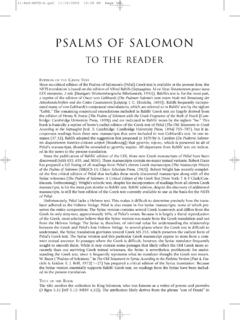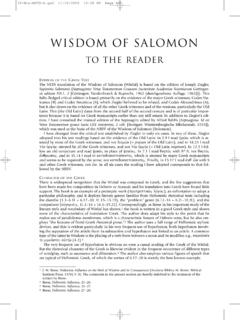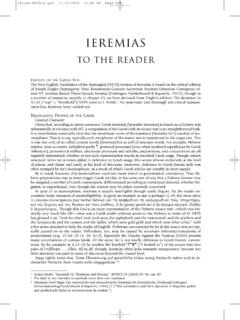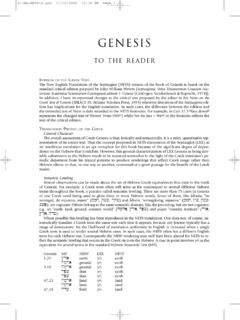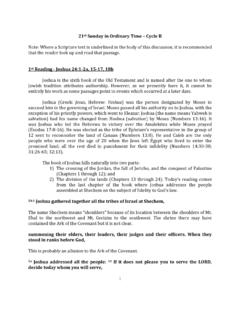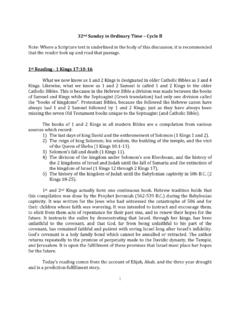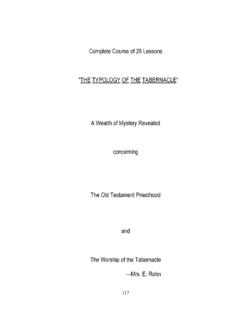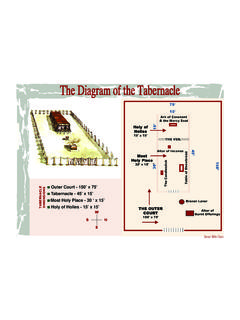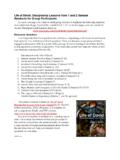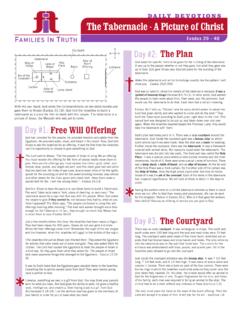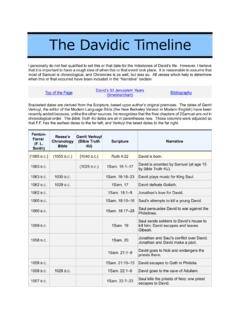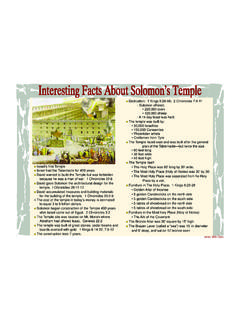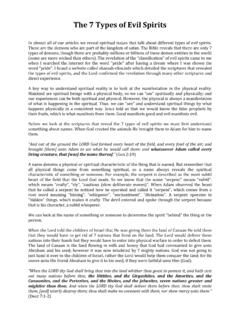Transcription of A New English Translation of the Septuagint. 01 Genesis
1 EDITION OF THEGREEKTEXTThe New English Translation of the septuagint (NETS) version of the book of Genesis is based on thestandard critical edition prepared by John William Wevers (Septuaginta: Vetus Testamentum Graecum Auc-toritate Academiae Scientiarum Gottingensis editum 1: Genesis [G ttingen: Vandenhoeck & Ruprecht, 1974]).In addition, I have incorporated changes to the critical text proposed by the editor in his Notes on theGreek Text of Genesis (SBLSCS 35; Atlanta: Scholars Press, 1993) wherever alteration of the Septuagintaedi-tion has implications for the English Translation .
2 In such cases, the difference between the edition andthe emended text of Notesis duly recorded in the NETS footnotes. For example, in Gen bface downbrepresents the changed text of Wevers Notes(WeN) while bon his face= Weedin the footnote reflects thetext of the critical OF THEGREEKG eneral CharacterThe overall assessment of Greek Genesis is that, lexically and syntactically, it is a strict, quantitative rep-resentation of its source text. Thus the concept proposed in NETS discussions of the septuagint (LXX) asan interlinear Translation is an apt metaphor for this book because of the significant degree of depen-dence on the Hebrew that it exhibits.
3 However, this general characterization of LXX Genesis as being slav-ishly subservient to the Hebrew needs to be nuanced somewhat in the light of the Greek translator s pe-riodic departures from his typical patterns to produce renderings that reflect Greek usage rather thanHebrew idiom, or that, in one way or another, contextualize a given passage for the benefit of the LevelingSeveral observations can be made about the set of Hebrew-Greek equivalences that exist in the bookof Genesis . For example, a Greek term often will serve as the counterpart to several different Hebrewterms throughout the book, a practice called semantic leveling.
4 There are more than 75 cases in Genesisof one Greek word being used to gloss three or more Hebrew words. Some of these, like a)dike/w bewronged, do injustice, injure (smx,q#(,rq#) and a)diki/a wrongdoing, injustice (smx, Nw(, q#(,(#p), are cognates. Others belong to the same semantic domain, like the preceding, but are not , gh= earth, land, ground, country, world (hmd), Cr), rp() and xw&ra country, territory (rw),Cr), hd#).Where possible this leveling has been reproduced in the NETS Translation . One does not, of course, au-tomatically translate a Greek term the same way each time it appears, because any lexeme typically has arange of denotations.
5 Yet the likelihood of Translation uniformity in English is increased when a singleGreek term is used to render several Hebrew ones. In such cases, the NRSV often has a different Englishterm for each Hebrew one. Consequently the NRSV rendering may well have been altered for NETS to re-flect the semantic leveling that occurs in the Greek vis- -vis the Hebrew. A case in point involves gh=as theequivalent for several terms in the standard Hebrew Masoretic Text (MT). )earthgh~earthhmd)groundgh~ )groundgh~earthrp(dustgh~earthrp(dustgh~ )landgh~landhmd)landgh~ #fieldgh~landGENESISTO THE 11/10/2009 10.
6 18 PM Page 12TO THE READER OF GenesisIn the preceding examples, decisions as to which English terms to use for NETS are based on factorssuch as their suitability in context as equivalents for gh=, and the way in which, in a given chapter or peri-cope, those terms reflect the Greek translator s uniformity of word choice in rendering a variety of He-brew DifferentiationAlthough there is a good deal of evidence for semantic leveling in LXX Genesis , a significant amountof semantic differentiation also takes place. Such situations often showcase the translator s skill or cre-ativity in employing a variety of Greek equivalents for individual Hebrew terms or expressions in accor-dance with the demands of each verbs tend to generate greater numbers of Greek counterparts than nouns or adjectives do.
7 Onesuch verb is Klh, which occurs 113 times in the Qal stem, and for which the LXX translator has used six-teen verbal roots as well as the adverbial forms deu~ro (3) come and deu=te(2) come. In the majority ofcases (58%), poreu/omai(61) go, proceed, walk, walk on, journey, travel and its compound forms pro-poreu/omai(2) go on, go on before, and sumporeu/omai(3) journey together, go along serve as equiv-alents. e1rxomai(3) go, come and its compounds a)pe/rxomai(21) go away, go off, depart, die/rxomai(1) go through and e)ce/rxomai(1) go forth account for another 23%.
8 The other Greek verbal roots thathave been selected to render the Qal of Klhare: a)podidra/skw(1) escape, a)poi/xomai(2) depart, a)polu/omai(1) go away, a)potre/xw(2) hurry off, leave quickly, badi/zw(1) go, e)pife/romai(1) becarried along, oi1xomai(3) leave, go away, and probai/nw (1) .. gi/nomai(1) keep getting (greater). The three remaining cases of Qal Klhare not represented quantitatively in the Greek. Three additionalGreek verbal roots serve as counterparts to the Hithpael stem of Klhin the eight places that it occurs inGenesis: diodeu/w(1) pass through, eu)areste/w be well pleasing (to / before God) (6) in a dynamicequivalent rendering of ynpl/ t) Klhth walk (with / before God) and peripate/w(1) walk about.
9 The Hebrew noun #pncan serve as a representative example of non-verbal forms that exhibit seman-tic differentiation. In 41 of the 43 contexts in which it is found (95%), the LXX translator s equivalent isyuxh/ animating force, creature, being, soul, life, heart, person. In the remaining cases, however, thetranslator has chosen the plural of a)nh/r, men, to describe the ones whom Abram rescued from thecoalition of kings who had invaded the cities of the plain ( ) and the plural of sw~ma slaves to de-pict members of Esau s household ( ).
10 NeologismsThe LXX of Genesis features approximately 50 terms that do not appear in extant Greek literature thatdates prior to the creation of this Translation . Most of these, of course, are based on existing stems, andso some whose cognates do pre-date, or are contemporaneous with, the LXX may well already have beenin use. The fact that they are previously unattested is no doubt accidental. Examples of this sort includecompounds with the a)rxi- prefix, a good number of which apparently made their first appearance in theHellenistic period. Thus in Genesis one encounters forms like a)rxidesmofu/lac/ a/rxidesmw/thj chiefjailer, a)rxima/geiroj chief butcher, and a)rxisitopoio/j chief baker, whose unprefixed forms desmo-fu/lac/ desmw/thj jailer, ma/geiroj butcher, and sitopoio/j baker are attested by the time of thetranslation of the Pentateuch into Greek.
